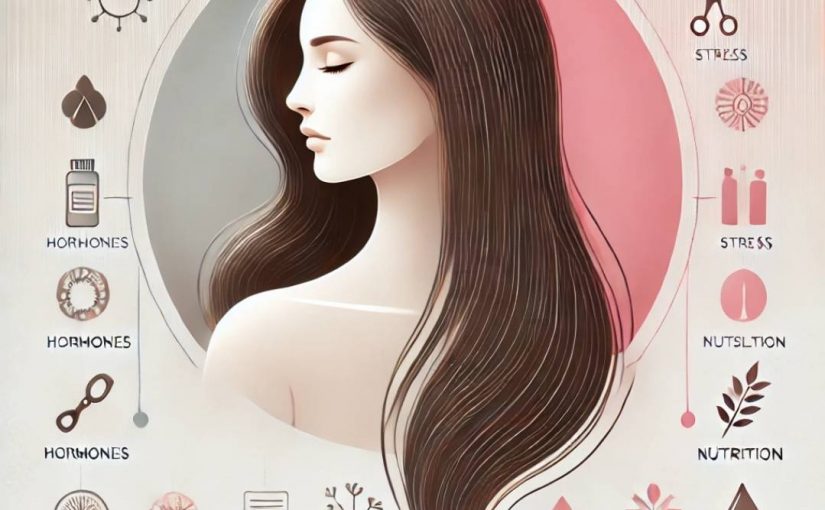บทความโดย นพ.ปิยะวํฒน์ ภูมิสุวรรณ
English
ผมร่วงและผมบางเป็นปัญหาที่พบได้บ่อยในผู้หญิงทุกวัยซึ่งอาจส่งผลต่อความมั่นใจและสุขภาพจิตใจของหลายคน สาเหตุของผมร่วงในผู้หญิงมีความซับซ้อนและหลากหลาย
บทความนี้จะพาคุณไปทำความเข้าใจถึงปัจจัยที่ทำให้เกิดปัญหา พร้อมแนะนำวิธีดูแลและป้องกันอย่างถูกต้อง
สาเหตุหลักของผมร่วงผมบางในผู้หญิง
- ฮอร์โมนและพันธุกรรม
- การเปลี่ยนแปลงของฮอร์โมน เช่น ในช่วงตั้งครรภ์ หลังคลอด หรือวัยหมดประจำเดือน อาจทำให้ผมร่วงมากกว่าปกติ
- พันธุกรรมสามารถมีผลต่อการเกิดภาวะผมบางแบบผู้หญิง (Female Pattern Hair Loss) ซึ่งมักเริ่มที่กลางศีรษะและกระจายออกด้านข้าง
- ความเครียดและปัญหาทางจิตใจ
- ความเครียดทางร่างกายหรือจิตใจสามารถทำให้ผมหลุดร่วงได้ เช่น ภาวะ Telogen Effluvium ที่เกิดจากความเครียดทำให้ผมเข้าสู่ระยะพักพร้อมกัน
- ปัญหาทางจิตใจ เช่น ภาวะวิตกกังวลหรือซึมเศร้า ก็ส่งผลต่อสุขภาพผมได้
- โรคและปัญหาสุขภาพ
- โรคบางชนิด เช่น โรคไทรอยด์ โรคภูมิคุ้มกัน หรือโรคโลหิตจาง เป็นเหตุที่ทำให้ผมร่วงผมบางได้
- การนอนไม่หลับ พักผ่อนน้อย ก็ส่งผลกระทบต่อผมร่วงผมบางเช่นกัน
- โภชนาการที่ไม่สมดุล
- การขาดสารอาหารที่จำเป็น เช่น ธาตุเหล็ก สังกะสี ไบโอติน และโปรตีน
- การลดน้ำหนักอย่างรวดเร็วหรือการทานอาหารที่ไม่มีคุณค่าทางโภชนาการ
- การใช้สารเคมีและความเสียหายจากการจัดแต่งผม
- การใช้สารเคมี เช่น การย้อมผม ดัดผม หรือยืดผม กระตุ้นให้เกิดการระคายเคืองที่ศีรษะและรากผมซึ่งมีผลต่อการขึ้นและการเติบโตของเส้นผม หากมีความจำเป็นต้องดัดผม ย้อมผม ควรใช้ผลิตภัณฑ์ดูแลหนังศีระและรากผมหลังการทำสีหรือดัดผม เช่น Natural Hair Spray
- การระคายเคืองจากผลิตภัณฑ์ที่ใช้เป็นประจำ เช่น แชมพู ครีมนวดผม การระคายเคืองนี้สามารถตรวพบได้ด้วยกล้องขยายไมโครสโครป หากคุณมีหนังศีรษะที่ไวต่อการระคายเคือง แนะนำให้ใช้แชมพูที่ปราศจากสารซัลเฟต ปราศจากน้ำหอมและสารเคมีกันบูด
- อายุที่เพิ่มขึ้น
- เมื่ออายุมากขึ้น วงจรการเจริญเติบโตของเส้นผมจะสั้นลง ทำให้ผมบางและหลุดร่วงง่ายขึ้น การได้รับทรีตเมนต์อย่างสม่ำเสมอจะช่วยยืดอายุเส้นผมและจำนวนเส้นผมได้
วิธีดูแลและป้องกันปัญหาผมร่วงผมบาง
- ดูแลสุขภาพจากภายใน
- รับประทานอาหารที่มีประโยชน์ เช่น ผักผลไม้ เนื้อปลา และธัญพืช
- เสริมวิตามินที่จำเป็น เช่น ไบโอติน วิตามินดี ธาตุเหล็ก และผลิตภัณฑ์จากธรรมชาติที่ช่วยบำรุงผม
- จัดการความเครียด
- ใช้เวลาในการผ่อนคลาย เช่น การทำสมาธิ โยคะ หรือออกกำลังกาย นอนหลับพักผ่อนให้เพียงพอ
- ใช้ผลิตภัณฑ์ดูแลเส้นผมที่เหมาะสม
- เลือกแชมพูและครีมนวดที่อ่อนโยนและเหมาะกับสภาพผม ปราศจากสารซัลเฟต ปราศจากสารซิลิโคน ปราศจากน้ำหอมและสารเคมีกันบูด
- ปรึกษาแพทย์ผู้เชี่ยวชาญ
- หากมีปัญหาผมร่วงเรื้อรัง ควรปรึกษาแพทย์ผู้เชี่ยวชาญด้านหนังศีรษะเพื่อวินิจฉัยและรักษาอย่างเหมาะสม
-
การรักษาด้วยเลเซอร์
เมโสเธอราปี โลชั่น และยากิน ตามความเหมาะสมจะช่วยให้ผมหยุกร่วงและขึ้นกลับมาได้
สรุป
- ผมร่วงผมบางในผู้หญิงอาจเกิดจากปัจจัยหลายอย่าง ทั้งฮอร์โมน ความเครียด สุขภาพ และการดูแลที่ไม่เหมาะสม
- การเข้าใจสาเหตุและเลือกวิธีการดูแลที่ถูกต้องเป็นกุญแจสำคัญในการป้องกันและฟื้นฟูสุขภาพเส้นผมของคุณ
- การปรึกษาแพทย์ผู้เชี่ยวชาญถือเป็นทางเลือกที่ดีที่สุดเพื่อหาสาเหตุและรักษาอย่างตรงจุด
บทความนี้หวังว่าจะช่วยให้คุณเข้าใจปัญหาผมร่วงได้มากขึ้น และพร้อมดูแลเส้นผมของคุณให้แข็งแรงและสุขภาพดี!
